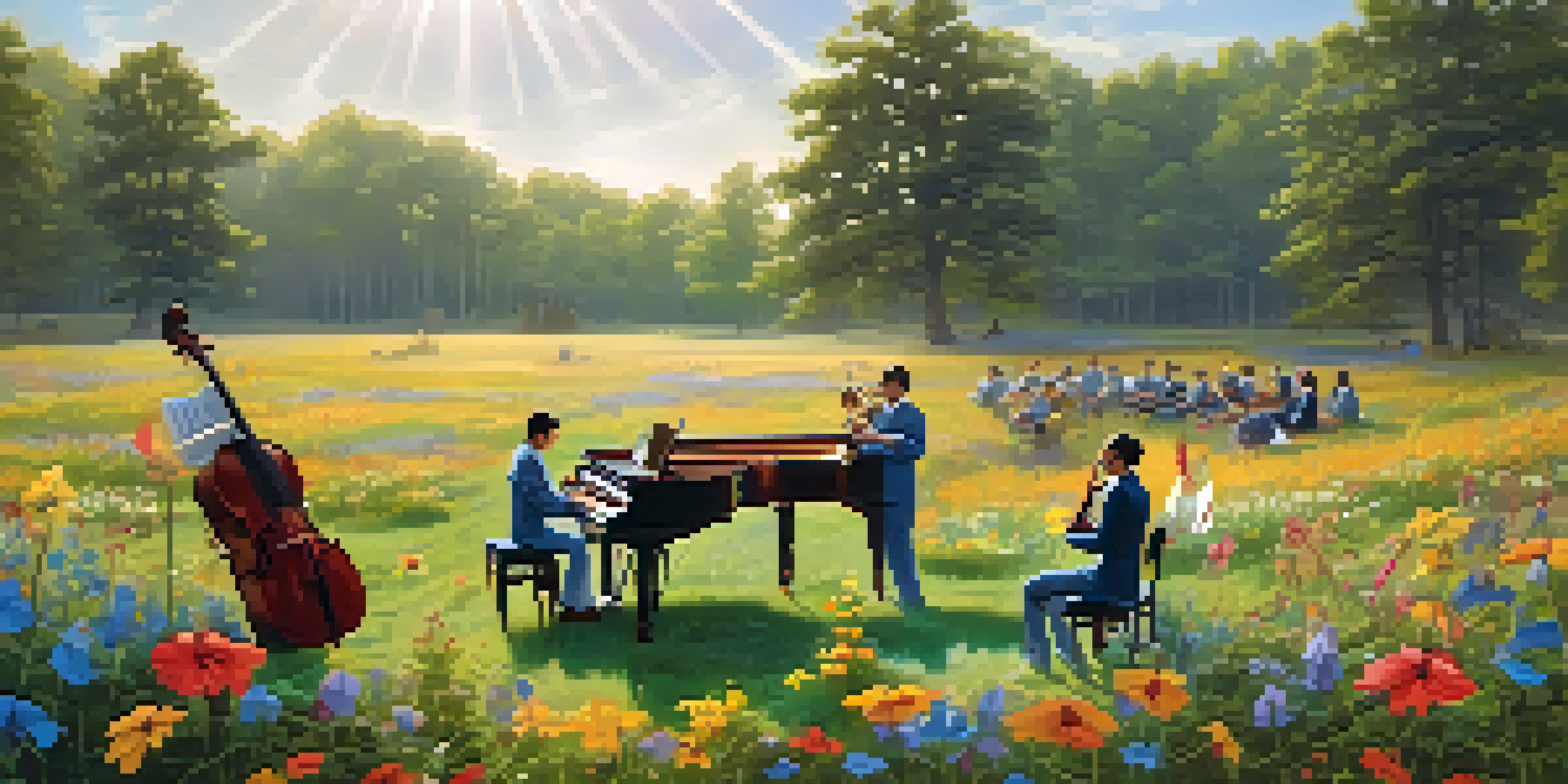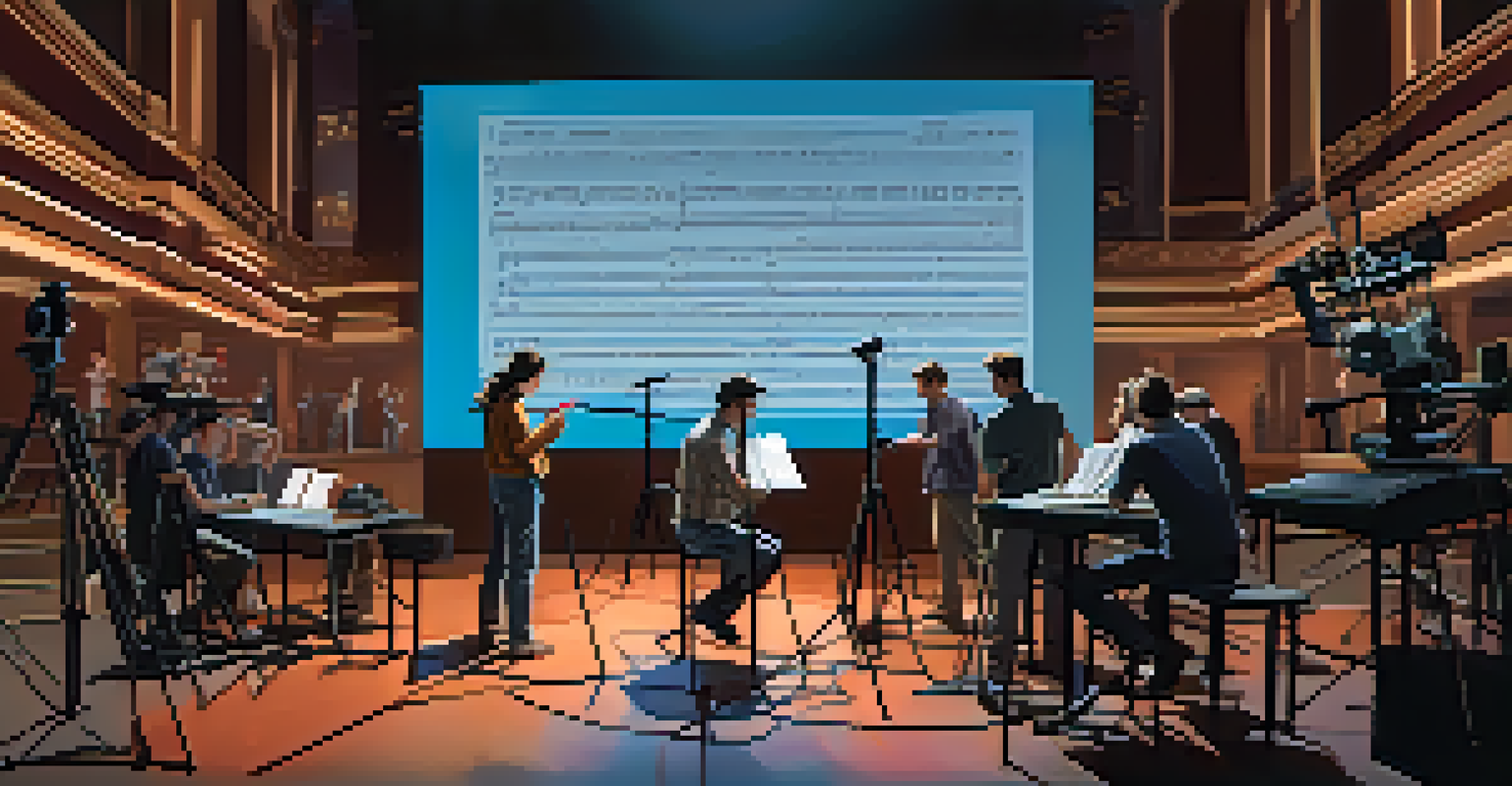How Music Influences Audience Perception in Film Viewing

The Emotional Connection: Music and Audience Feelings
Music has an incredible ability to evoke emotions, often more than visuals alone. Think about the last time you watched a movie; the score likely intensified your feelings during key scenes, whether it was joy, sadness, or suspense. For example, the iconic theme from 'Jaws' creates an immediate sense of dread, setting the tone before you even see the shark.
Music can change the world because it can change people.
This emotional connection is intentional. Composers craft music to align with the narrative, guiding the audience's feelings and reactions. By manipulating tempo and harmony, music can transform a light-hearted scene into one filled with anxiety, simply by changing a few notes.
Ultimately, the interplay between music and emotion fosters a deeper investment in the story. Audiences are more likely to connect with characters and plotlines when guided by a well-crafted score, enhancing their overall viewing experience.
Setting the Scene: The Role of Music in Atmosphere
Music isn’t just about emotions; it also sets the atmosphere of a film. The right soundtrack can transport viewers to different times and places, instantly immersing them in the film's world. For instance, the use of orchestral music in epic fantasy films helps create a grand sense of adventure, while a sparse piano score might evoke a feeling of intimacy.

Moreover, music can signify cultural context and time periods. A jazz soundtrack can evoke the vibrant nightlife of the 1920s, while electronic beats might suggest a modern urban setting. This contextual cueing helps the audience feel the environment, making the film's world more believable.
Music Evokes Deep Emotions
The emotional connection between music and film enhances audience feelings, guiding their reactions and investment in the story.
By carefully choosing the right music, filmmakers can encapsulate the essence of their story, enhancing the audience's understanding of the narrative's backdrop. This atmospheric layer adds richness to the viewing experience, making it more engaging.
Character Development: Music as a Narrative Tool
Music can also serve as a powerful tool for character development. Themes associated with specific characters can evolve throughout a film, reflecting their journeys and transformations. For instance, the transition from a light, playful theme to a darker, more intense motif can signify a character's internal struggle.
Without music, life would be a mistake.
This technique allows the audience to gain insight into characters' emotional states and motivations. When a character faces a critical decision, the accompanying music can heighten the tension, allowing viewers to feel a deeper connection to their plight.
By utilizing music in this way, filmmakers create a more layered narrative, where the audience is not just passive observers but active participants in the characters' journeys. This engagement can make the story even more compelling.
Cues and Expectations: How Music Guides Viewer Reactions
Music often provides cues that guide audience expectations and reactions. For instance, a sudden crescendo can signal an impending scare in a horror film, preparing viewers for a jump scare. This use of music as a predictive tool shapes how audiences respond to the unfolding story.
These musical cues can create a sense of familiarity, allowing audiences to anticipate plot developments. When viewers recognize patterns in music, they can feel a sense of satisfaction when their expectations are met, which reinforces their engagement.
Music Shapes Film Atmosphere
Soundtracks create immersive environments, transporting viewers and setting the cultural context of a film's narrative.
Consequently, filmmakers can manipulate audience reactions through strategic musical placement, creating tension and excitement. This artful orchestration of sound and silence keeps viewers on the edge of their seats.
Genre-Specific Sounds: Music as a Defining Element
Different film genres often rely on specific musical styles to evoke appropriate feelings. For example, a horror film typically employs dissonant chords and eerie soundscapes, while a romantic comedy might feature light, upbeat melodies. These genre-specific sounds help establish a film's identity before the plot even begins.
Viewers come to associate certain musical elements with particular genres, which helps set their expectations. This familiarity can enhance enjoyment, as audiences often have preferences for specific styles of music that resonate with them.
By understanding how music defines genres, filmmakers can craft more effective soundtracks. This alignment between genre and musical style not only supports storytelling but also enhances the overall viewer experience.
Historical Context: The Evolution of Film Music
The role of music in film has evolved significantly since the early days of cinema. Initially, silent films relied on live music to create mood and enhance storytelling, with pianists improvising scores to match the on-screen action. As technology advanced, recorded soundtracks became integral, allowing for more complex compositions.
Today, film scores are meticulously crafted, often involving orchestras and digital tools to create immersive soundscapes. This evolution reflects changing audience expectations and the recognition of music's critical role in storytelling.
Character Themes Reflect Growth
Musical themes associated with characters evolve throughout a film, providing insight into their emotional journeys and transformations.
Understanding this historical context helps us appreciate the artistry behind modern film scores. Each note, rhythm, and melody is the result of years of development, designed to enhance the emotional and narrative depth of films.
The Impact of Music on Audience Memory and Recall
Music has a profound effect on memory, often helping audiences recall specific scenes long after viewing a film. The brain is wired to associate certain melodies with experiences, making it easier to remember moments tied to those sounds. This phenomenon explains why certain film scores stay with us for years.
For example, the haunting melody of 'Titanic' evokes memories of key scenes, allowing viewers to relive emotional moments simply by hearing the music. This connection can influence not only how a film is remembered but also how it is discussed and shared in popular culture.

By creating memorable musical themes, filmmakers can ensure their stories resonate long after the credits roll. This lasting impact emphasizes the importance of music in film, not just as an accompaniment but as a vital component of storytelling.